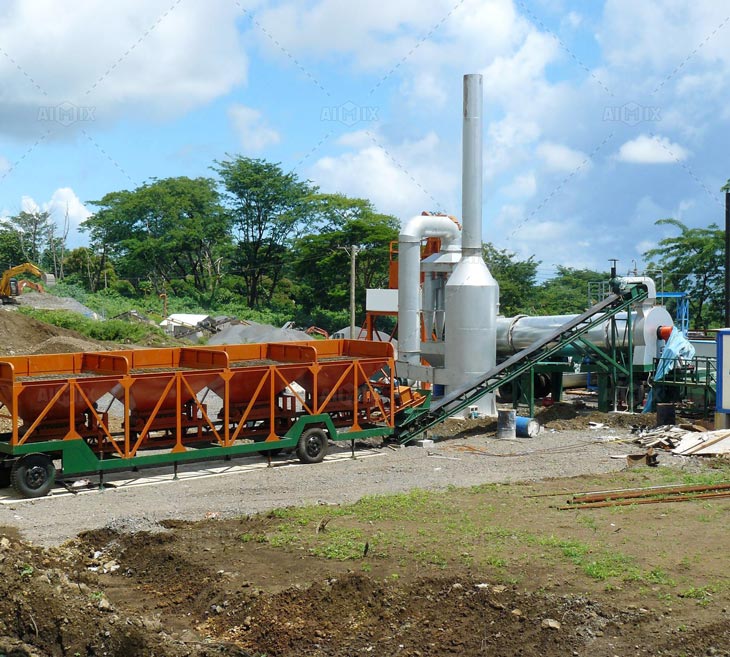Continuous asphalt plants play a critical role in modern road construction, offering efficient and consistent production of asphalt mixtures. This article explores the fundamentals of continuous asphalt plants, their working principles, advantages, and applications in the construction industry.
What Is a Continuous Asphalt Plant?
A continuous asphalt plant(planta de asfalto continua) is a type of equipment designed to produce asphalt mixtures without interruptions. Unlike batch plants, continuous plants streamline the process by feeding materials continuously, resulting in a steady output of asphalt mix. These plants are ideal for large-scale projects where high productivity and efficiency are essential.
Key Components of a Continuous Asphalt Plant
To understand how a continuous asphalt plant works, it is essential to familiarize yourself with its core components. These include:
- Cold Aggregate Feeder: Stores and feeds raw materials into the system at controlled rates.
- Dryer Drum: Dries and heats aggregates for better asphalt binding, ensuring the removal of moisture.
- Burner: Provides the required heat energy to dry the aggregates efficiently.
- Mixing Unit: Combines the heated aggregates with the asphalt binder to create a homogeneous mixture.
- Control System: Enables precise monitoring and adjustment of the plant’s operations to ensure consistent output.
- Storage Silo: Temporarily stores the finished asphalt mix for convenient loading and transportation.
How Does a Continuous Asphalt Plant Work?
The working principle of a continuous asphalt plant involves a seamless process of material feeding, heating, mixing, and discharging. Below is a detailed breakdown of the key steps:
Step 1: Aggregate Feeding
Cold aggregates of varying sizes are fed into the cold aggregate feeder bins. These materials are then transferred to the conveyor belts, which transport them into the dryer drum.
Step 2: Aggregate Drying and Heating
Inside the dryer drum, the aggregates are dried and heated to the desired temperature. The burner provides consistent heat, ensuring the removal of moisture and preparing the aggregates for mixing.
Step 3: Asphalt Mixing
The heated aggregates are combined with the asphalt binder in the mixing unit. This step involves precise blending to achieve a uniform mixture that meets quality standards.
Step 4: Continuous Discharge
The final asphalt mix is continuously discharged onto a conveyor or directly into transport vehicles. This uninterrupted process ensures a steady supply of asphalt for on-site paving operations.
Advantages of Continuous Asphalt Plants
Continuous asphalt plants of AIMIX Group Co., Ltd. China are widely used in the construction industry due to their numerous benefits. Some of the most notable advantages include:
1. Enhanced Efficiency
The uninterrupted production process eliminates downtime, allowing for faster project completion and increased productivity.
2. Cost Savings
With fewer operational steps and streamlined workflows, continuous plants reduce energy consumption and labor costs, making them a cost-effective choice for contractors.
3. Consistent Quality
The continuous mixing process ensures uniform composition, producing high-quality asphalt mixtures that meet industry standards.
4. Space Optimization
The compact design of continuous asphalt plants makes them suitable for sites with limited space while still delivering high output.
5. Environmental Benefits
Modern continuous plants are equipped with pollution control systems, reducing emissions and ensuring compliance with environmental regulations.
Applications of Continuous Asphalt Plants
Continuous asphalt plants are versatile and can be used in various construction projects, including:
- Road and Highway Construction: Ideal for producing large volumes of asphalt for extensive paving projects.
- Airport Runways: Provides the high-quality asphalt needed for durable and smooth surfaces.
- Parking Lots: Ensures efficient asphalt production for commercial and residential parking spaces.
- Urban Infrastructure: Suitable for asphalt production in city road repairs and upgrades.
Challenges and Maintenance of Continuous Asphalt Plants
While continuous asphalt plants offer numerous advantages, they require proper maintenance to ensure optimal performance. Common challenges include:
- Ensuring consistent material feeding to avoid disruptions.
- Regularly inspecting and maintaining the burner and dryer drum.
- Calibrating the control system to maintain accuracy.
- Addressing wear and tear of critical components like conveyors and mixers.
By addressing these challenges through regular maintenance, contractors can maximize the lifespan and efficiency of their continuous asphalt plants.
Conclusion
Continuous asphalt plants are an essential part of modern construction, providing a reliable, efficient, and cost-effective solution for asphalt production. By understanding their components, working principles, and advantages, contractors can make informed decisions and optimize their construction projects.
Investing in a high-quality continuous asphalt plant ensures consistent performance, contributing to the successful completion of infrastructure projects worldwide.


Comments
No comments yet. Be the first to react!